Critical Reflective Analysis: Lessons Learned From Grandfather's Death
VerifiedAdded on 2023/06/10
|7
|2082
|406
Essay
AI Summary
This essay presents a critical reflective analysis of the author's personal experience following the death of their grandfather, focusing on the physical, emotional, cognitive, behavioral, social, and spiritual impacts of grief. It explores various theories of mourning to understand the emotional responses and the recovery process, highlighting the importance of emotional relocation, consolation, and integrating the loss into one's life. The author reflects on the lessons learned during the grieving period, emphasizing the potential for personal growth and the significance of acknowledging both the value of love and the solitude that death brings. The essay concludes by advocating for a balanced approach to loss, encouraging the remembrance of positive aspects of the relationship with the deceased and the investment of energy into new affections, while acknowledging that grief is an indicator of love and an inherent part of life.
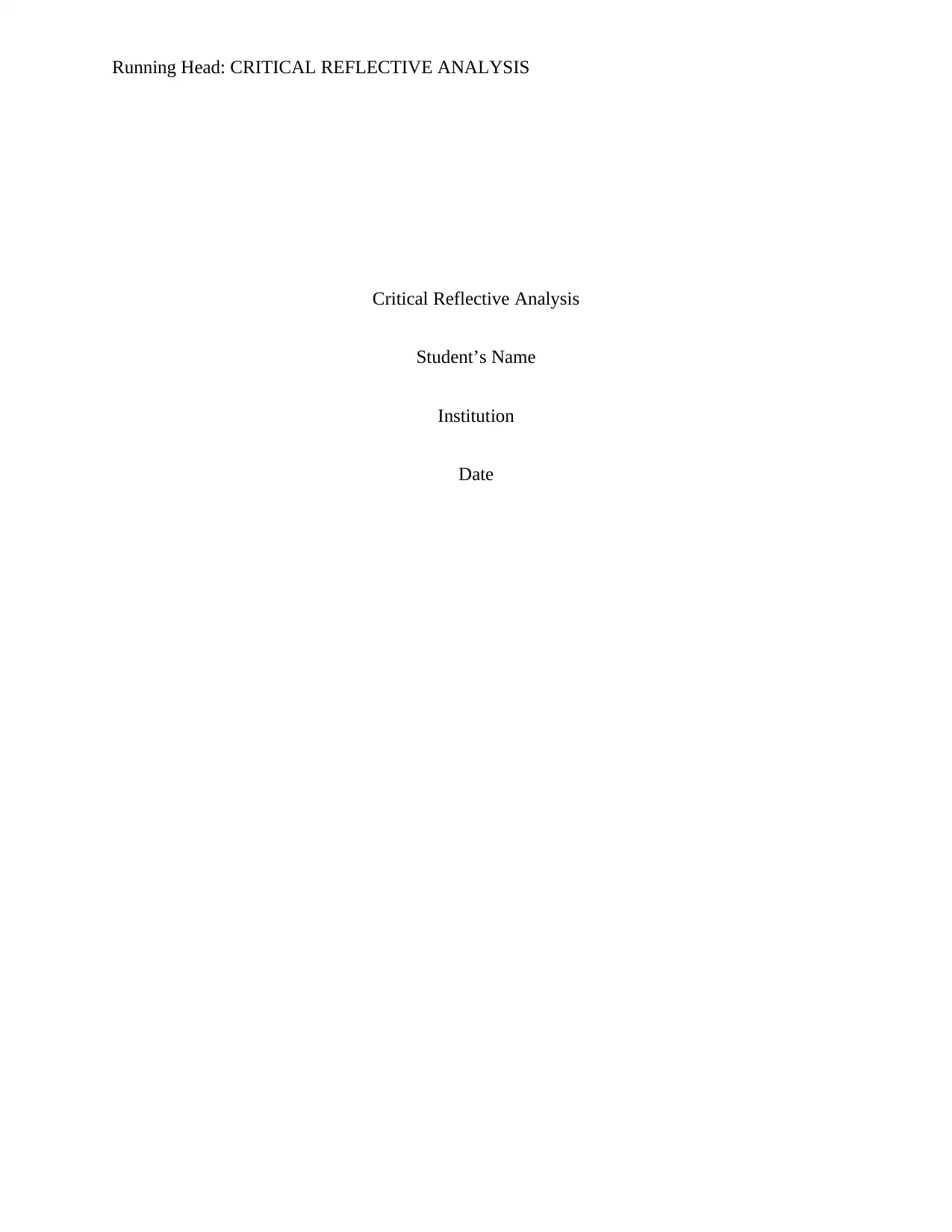
Running Head: CRITICAL REFLECTIVE ANALYSIS
Critical Reflective Analysis
Student’s Name
Institution
Date
Critical Reflective Analysis
Student’s Name
Institution
Date
Paraphrase This Document
Need a fresh take? Get an instant paraphrase of this document with our AI Paraphraser
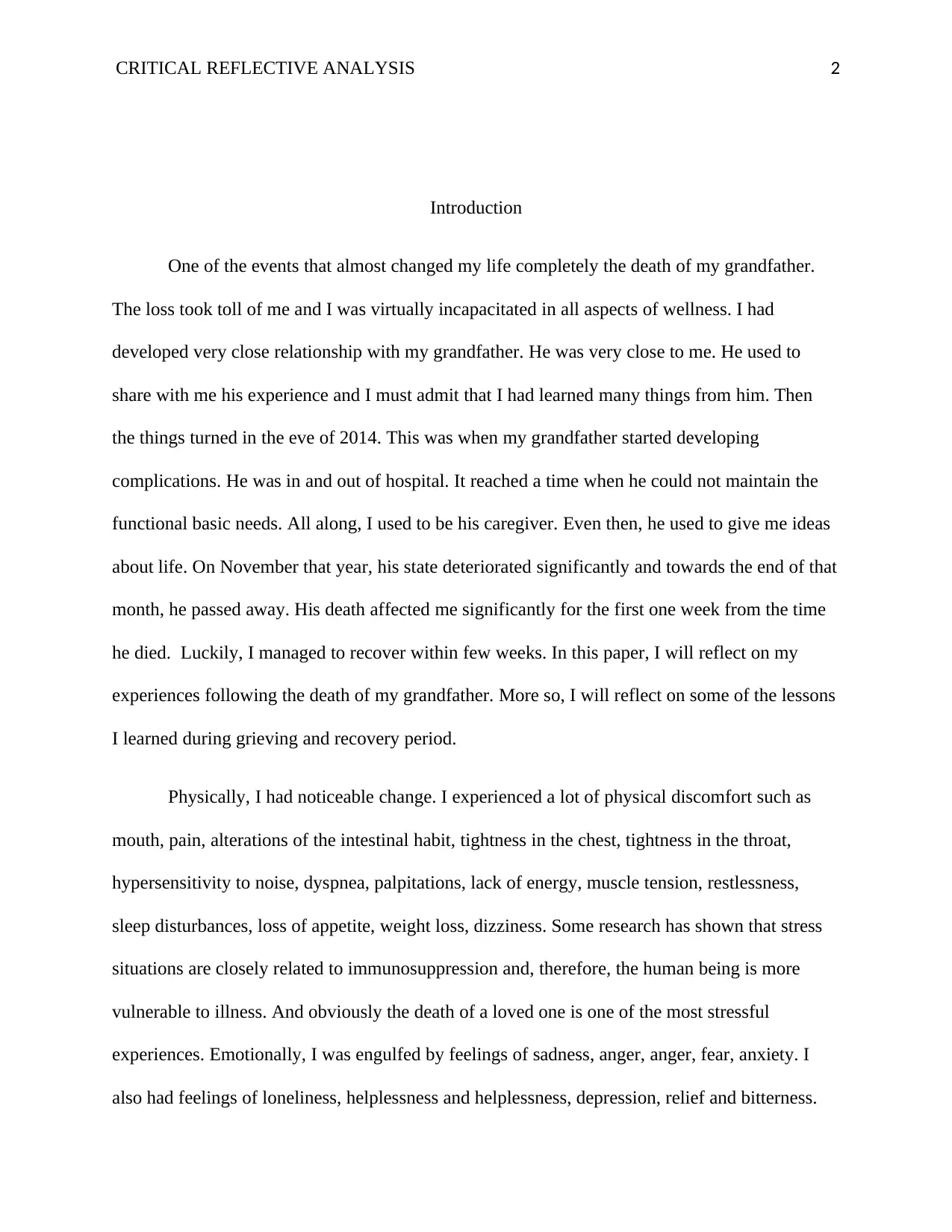
CRITICAL REFLECTIVE ANALYSIS 2
Introduction
One of the events that almost changed my life completely the death of my grandfather.
The loss took toll of me and I was virtually incapacitated in all aspects of wellness. I had
developed very close relationship with my grandfather. He was very close to me. He used to
share with me his experience and I must admit that I had learned many things from him. Then
the things turned in the eve of 2014. This was when my grandfather started developing
complications. He was in and out of hospital. It reached a time when he could not maintain the
functional basic needs. All along, I used to be his caregiver. Even then, he used to give me ideas
about life. On November that year, his state deteriorated significantly and towards the end of that
month, he passed away. His death affected me significantly for the first one week from the time
he died. Luckily, I managed to recover within few weeks. In this paper, I will reflect on my
experiences following the death of my grandfather. More so, I will reflect on some of the lessons
I learned during grieving and recovery period.
Physically, I had noticeable change. I experienced a lot of physical discomfort such as
mouth, pain, alterations of the intestinal habit, tightness in the chest, tightness in the throat,
hypersensitivity to noise, dyspnea, palpitations, lack of energy, muscle tension, restlessness,
sleep disturbances, loss of appetite, weight loss, dizziness. Some research has shown that stress
situations are closely related to immunosuppression and, therefore, the human being is more
vulnerable to illness. And obviously the death of a loved one is one of the most stressful
experiences. Emotionally, I was engulfed by feelings of sadness, anger, anger, fear, anxiety. I
also had feelings of loneliness, helplessness and helplessness, depression, relief and bitterness.
Introduction
One of the events that almost changed my life completely the death of my grandfather.
The loss took toll of me and I was virtually incapacitated in all aspects of wellness. I had
developed very close relationship with my grandfather. He was very close to me. He used to
share with me his experience and I must admit that I had learned many things from him. Then
the things turned in the eve of 2014. This was when my grandfather started developing
complications. He was in and out of hospital. It reached a time when he could not maintain the
functional basic needs. All along, I used to be his caregiver. Even then, he used to give me ideas
about life. On November that year, his state deteriorated significantly and towards the end of that
month, he passed away. His death affected me significantly for the first one week from the time
he died. Luckily, I managed to recover within few weeks. In this paper, I will reflect on my
experiences following the death of my grandfather. More so, I will reflect on some of the lessons
I learned during grieving and recovery period.
Physically, I had noticeable change. I experienced a lot of physical discomfort such as
mouth, pain, alterations of the intestinal habit, tightness in the chest, tightness in the throat,
hypersensitivity to noise, dyspnea, palpitations, lack of energy, muscle tension, restlessness,
sleep disturbances, loss of appetite, weight loss, dizziness. Some research has shown that stress
situations are closely related to immunosuppression and, therefore, the human being is more
vulnerable to illness. And obviously the death of a loved one is one of the most stressful
experiences. Emotionally, I was engulfed by feelings of sadness, anger, anger, fear, anxiety. I
also had feelings of loneliness, helplessness and helplessness, depression, relief and bitterness.
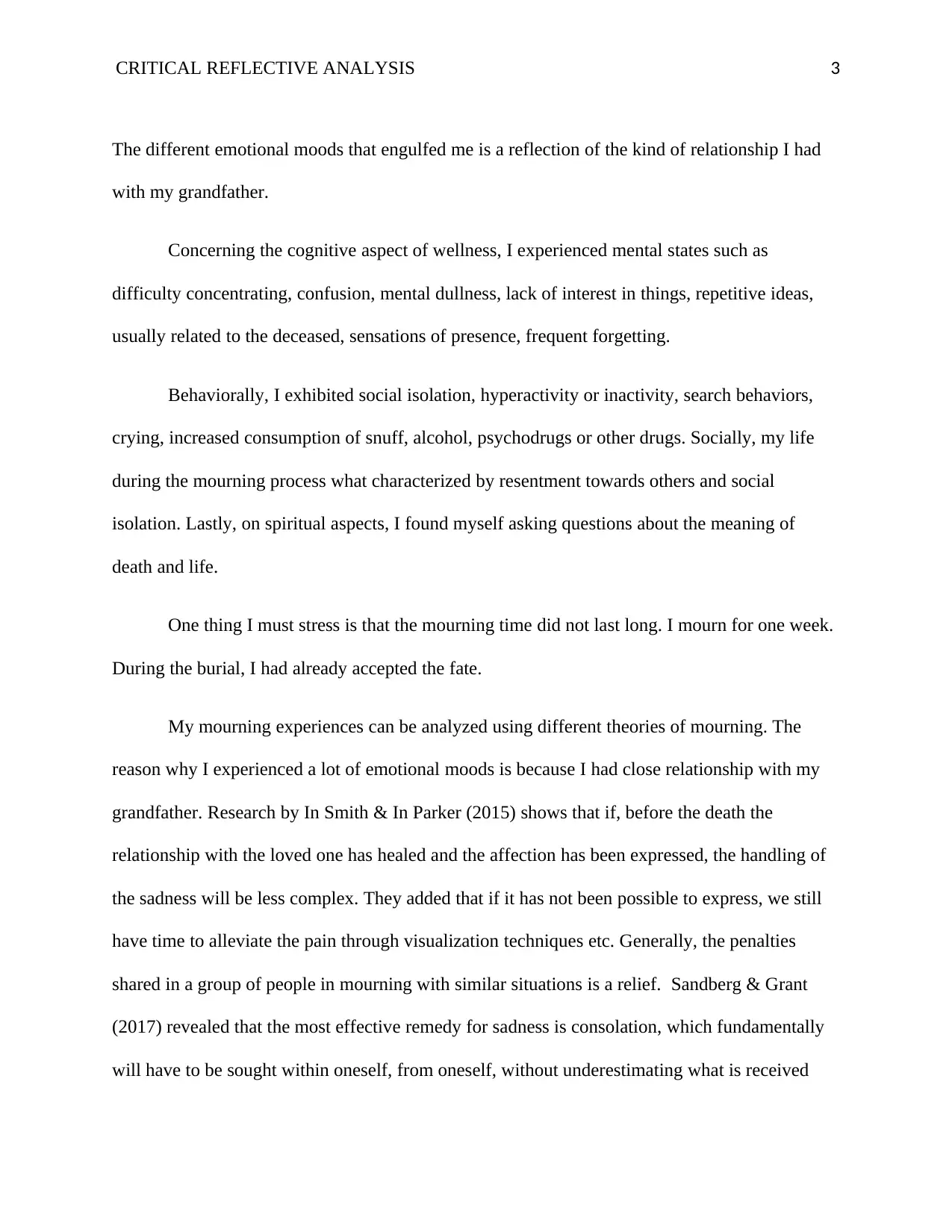
CRITICAL REFLECTIVE ANALYSIS 3
The different emotional moods that engulfed me is a reflection of the kind of relationship I had
with my grandfather.
Concerning the cognitive aspect of wellness, I experienced mental states such as
difficulty concentrating, confusion, mental dullness, lack of interest in things, repetitive ideas,
usually related to the deceased, sensations of presence, frequent forgetting.
Behaviorally, I exhibited social isolation, hyperactivity or inactivity, search behaviors,
crying, increased consumption of snuff, alcohol, psychodrugs or other drugs. Socially, my life
during the mourning process what characterized by resentment towards others and social
isolation. Lastly, on spiritual aspects, I found myself asking questions about the meaning of
death and life.
One thing I must stress is that the mourning time did not last long. I mourn for one week.
During the burial, I had already accepted the fate.
My mourning experiences can be analyzed using different theories of mourning. The
reason why I experienced a lot of emotional moods is because I had close relationship with my
grandfather. Research by In Smith & In Parker (2015) shows that if, before the death the
relationship with the loved one has healed and the affection has been expressed, the handling of
the sadness will be less complex. They added that if it has not been possible to express, we still
have time to alleviate the pain through visualization techniques etc. Generally, the penalties
shared in a group of people in mourning with similar situations is a relief. Sandberg & Grant
(2017) revealed that the most effective remedy for sadness is consolation, which fundamentally
will have to be sought within oneself, from oneself, without underestimating what is received
The different emotional moods that engulfed me is a reflection of the kind of relationship I had
with my grandfather.
Concerning the cognitive aspect of wellness, I experienced mental states such as
difficulty concentrating, confusion, mental dullness, lack of interest in things, repetitive ideas,
usually related to the deceased, sensations of presence, frequent forgetting.
Behaviorally, I exhibited social isolation, hyperactivity or inactivity, search behaviors,
crying, increased consumption of snuff, alcohol, psychodrugs or other drugs. Socially, my life
during the mourning process what characterized by resentment towards others and social
isolation. Lastly, on spiritual aspects, I found myself asking questions about the meaning of
death and life.
One thing I must stress is that the mourning time did not last long. I mourn for one week.
During the burial, I had already accepted the fate.
My mourning experiences can be analyzed using different theories of mourning. The
reason why I experienced a lot of emotional moods is because I had close relationship with my
grandfather. Research by In Smith & In Parker (2015) shows that if, before the death the
relationship with the loved one has healed and the affection has been expressed, the handling of
the sadness will be less complex. They added that if it has not been possible to express, we still
have time to alleviate the pain through visualization techniques etc. Generally, the penalties
shared in a group of people in mourning with similar situations is a relief. Sandberg & Grant
(2017) revealed that the most effective remedy for sadness is consolation, which fundamentally
will have to be sought within oneself, from oneself, without underestimating what is received
⊘ This is a preview!⊘
Do you want full access?
Subscribe today to unlock all pages.

Trusted by 1+ million students worldwide
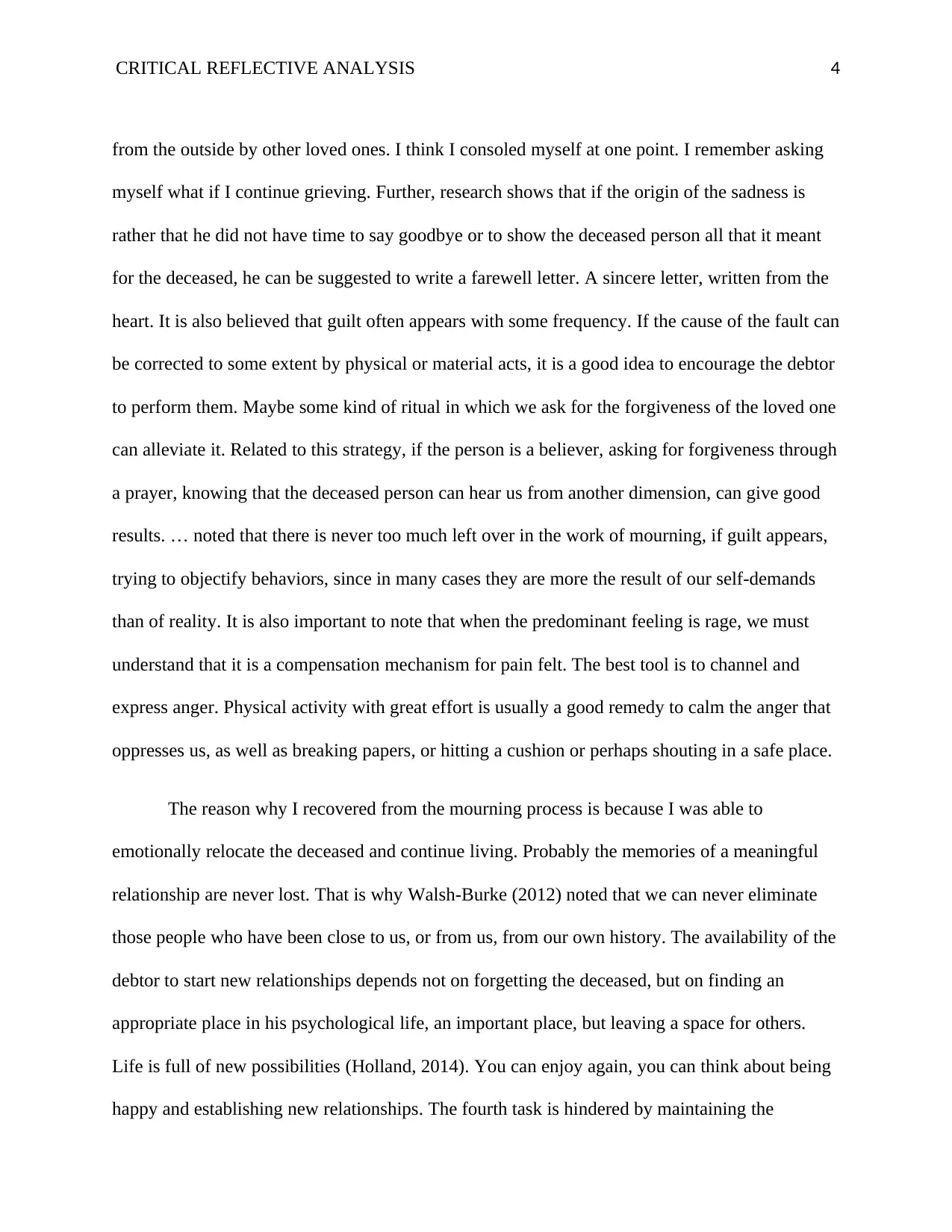
CRITICAL REFLECTIVE ANALYSIS 4
from the outside by other loved ones. I think I consoled myself at one point. I remember asking
myself what if I continue grieving. Further, research shows that if the origin of the sadness is
rather that he did not have time to say goodbye or to show the deceased person all that it meant
for the deceased, he can be suggested to write a farewell letter. A sincere letter, written from the
heart. It is also believed that guilt often appears with some frequency. If the cause of the fault can
be corrected to some extent by physical or material acts, it is a good idea to encourage the debtor
to perform them. Maybe some kind of ritual in which we ask for the forgiveness of the loved one
can alleviate it. Related to this strategy, if the person is a believer, asking for forgiveness through
a prayer, knowing that the deceased person can hear us from another dimension, can give good
results. … noted that there is never too much left over in the work of mourning, if guilt appears,
trying to objectify behaviors, since in many cases they are more the result of our self-demands
than of reality. It is also important to note that when the predominant feeling is rage, we must
understand that it is a compensation mechanism for pain felt. The best tool is to channel and
express anger. Physical activity with great effort is usually a good remedy to calm the anger that
oppresses us, as well as breaking papers, or hitting a cushion or perhaps shouting in a safe place.
The reason why I recovered from the mourning process is because I was able to
emotionally relocate the deceased and continue living. Probably the memories of a meaningful
relationship are never lost. That is why Walsh-Burke (2012) noted that we can never eliminate
those people who have been close to us, or from us, from our own history. The availability of the
debtor to start new relationships depends not on forgetting the deceased, but on finding an
appropriate place in his psychological life, an important place, but leaving a space for others.
Life is full of new possibilities (Holland, 2014). You can enjoy again, you can think about being
happy and establishing new relationships. The fourth task is hindered by maintaining the
from the outside by other loved ones. I think I consoled myself at one point. I remember asking
myself what if I continue grieving. Further, research shows that if the origin of the sadness is
rather that he did not have time to say goodbye or to show the deceased person all that it meant
for the deceased, he can be suggested to write a farewell letter. A sincere letter, written from the
heart. It is also believed that guilt often appears with some frequency. If the cause of the fault can
be corrected to some extent by physical or material acts, it is a good idea to encourage the debtor
to perform them. Maybe some kind of ritual in which we ask for the forgiveness of the loved one
can alleviate it. Related to this strategy, if the person is a believer, asking for forgiveness through
a prayer, knowing that the deceased person can hear us from another dimension, can give good
results. … noted that there is never too much left over in the work of mourning, if guilt appears,
trying to objectify behaviors, since in many cases they are more the result of our self-demands
than of reality. It is also important to note that when the predominant feeling is rage, we must
understand that it is a compensation mechanism for pain felt. The best tool is to channel and
express anger. Physical activity with great effort is usually a good remedy to calm the anger that
oppresses us, as well as breaking papers, or hitting a cushion or perhaps shouting in a safe place.
The reason why I recovered from the mourning process is because I was able to
emotionally relocate the deceased and continue living. Probably the memories of a meaningful
relationship are never lost. That is why Walsh-Burke (2012) noted that we can never eliminate
those people who have been close to us, or from us, from our own history. The availability of the
debtor to start new relationships depends not on forgetting the deceased, but on finding an
appropriate place in his psychological life, an important place, but leaving a space for others.
Life is full of new possibilities (Holland, 2014). You can enjoy again, you can think about being
happy and establishing new relationships. The fourth task is hindered by maintaining the
Paraphrase This Document
Need a fresh take? Get an instant paraphrase of this document with our AI Paraphraser
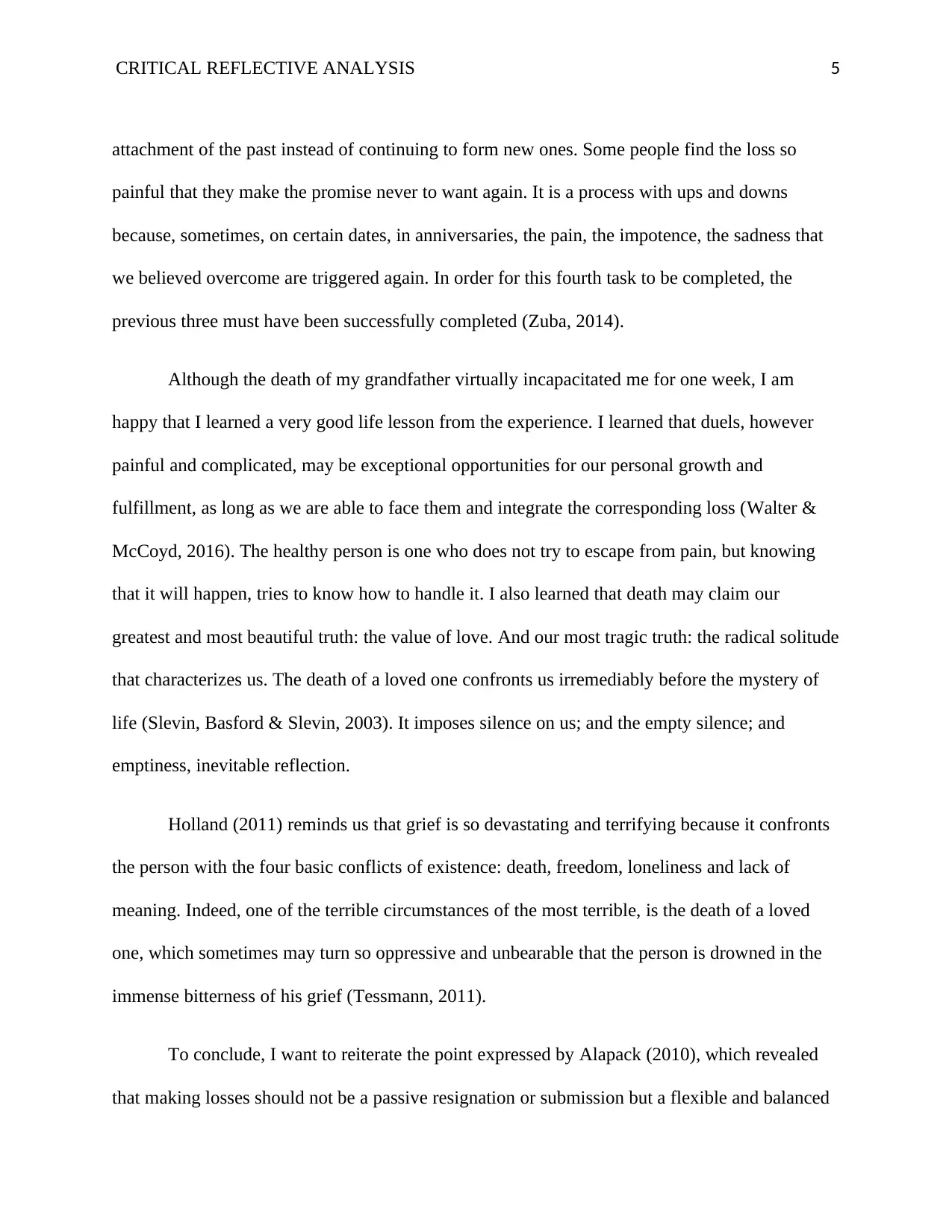
CRITICAL REFLECTIVE ANALYSIS 5
attachment of the past instead of continuing to form new ones. Some people find the loss so
painful that they make the promise never to want again. It is a process with ups and downs
because, sometimes, on certain dates, in anniversaries, the pain, the impotence, the sadness that
we believed overcome are triggered again. In order for this fourth task to be completed, the
previous three must have been successfully completed (Zuba, 2014).
Although the death of my grandfather virtually incapacitated me for one week, I am
happy that I learned a very good life lesson from the experience. I learned that duels, however
painful and complicated, may be exceptional opportunities for our personal growth and
fulfillment, as long as we are able to face them and integrate the corresponding loss (Walter &
McCoyd, 2016). The healthy person is one who does not try to escape from pain, but knowing
that it will happen, tries to know how to handle it. I also learned that death may claim our
greatest and most beautiful truth: the value of love. And our most tragic truth: the radical solitude
that characterizes us. The death of a loved one confronts us irremediably before the mystery of
life (Slevin, Basford & Slevin, 2003). It imposes silence on us; and the empty silence; and
emptiness, inevitable reflection.
Holland (2011) reminds us that grief is so devastating and terrifying because it confronts
the person with the four basic conflicts of existence: death, freedom, loneliness and lack of
meaning. Indeed, one of the terrible circumstances of the most terrible, is the death of a loved
one, which sometimes may turn so oppressive and unbearable that the person is drowned in the
immense bitterness of his grief (Tessmann, 2011).
To conclude, I want to reiterate the point expressed by Alapack (2010), which revealed
that making losses should not be a passive resignation or submission but a flexible and balanced
attachment of the past instead of continuing to form new ones. Some people find the loss so
painful that they make the promise never to want again. It is a process with ups and downs
because, sometimes, on certain dates, in anniversaries, the pain, the impotence, the sadness that
we believed overcome are triggered again. In order for this fourth task to be completed, the
previous three must have been successfully completed (Zuba, 2014).
Although the death of my grandfather virtually incapacitated me for one week, I am
happy that I learned a very good life lesson from the experience. I learned that duels, however
painful and complicated, may be exceptional opportunities for our personal growth and
fulfillment, as long as we are able to face them and integrate the corresponding loss (Walter &
McCoyd, 2016). The healthy person is one who does not try to escape from pain, but knowing
that it will happen, tries to know how to handle it. I also learned that death may claim our
greatest and most beautiful truth: the value of love. And our most tragic truth: the radical solitude
that characterizes us. The death of a loved one confronts us irremediably before the mystery of
life (Slevin, Basford & Slevin, 2003). It imposes silence on us; and the empty silence; and
emptiness, inevitable reflection.
Holland (2011) reminds us that grief is so devastating and terrifying because it confronts
the person with the four basic conflicts of existence: death, freedom, loneliness and lack of
meaning. Indeed, one of the terrible circumstances of the most terrible, is the death of a loved
one, which sometimes may turn so oppressive and unbearable that the person is drowned in the
immense bitterness of his grief (Tessmann, 2011).
To conclude, I want to reiterate the point expressed by Alapack (2010), which revealed
that making losses should not be a passive resignation or submission but a flexible and balanced
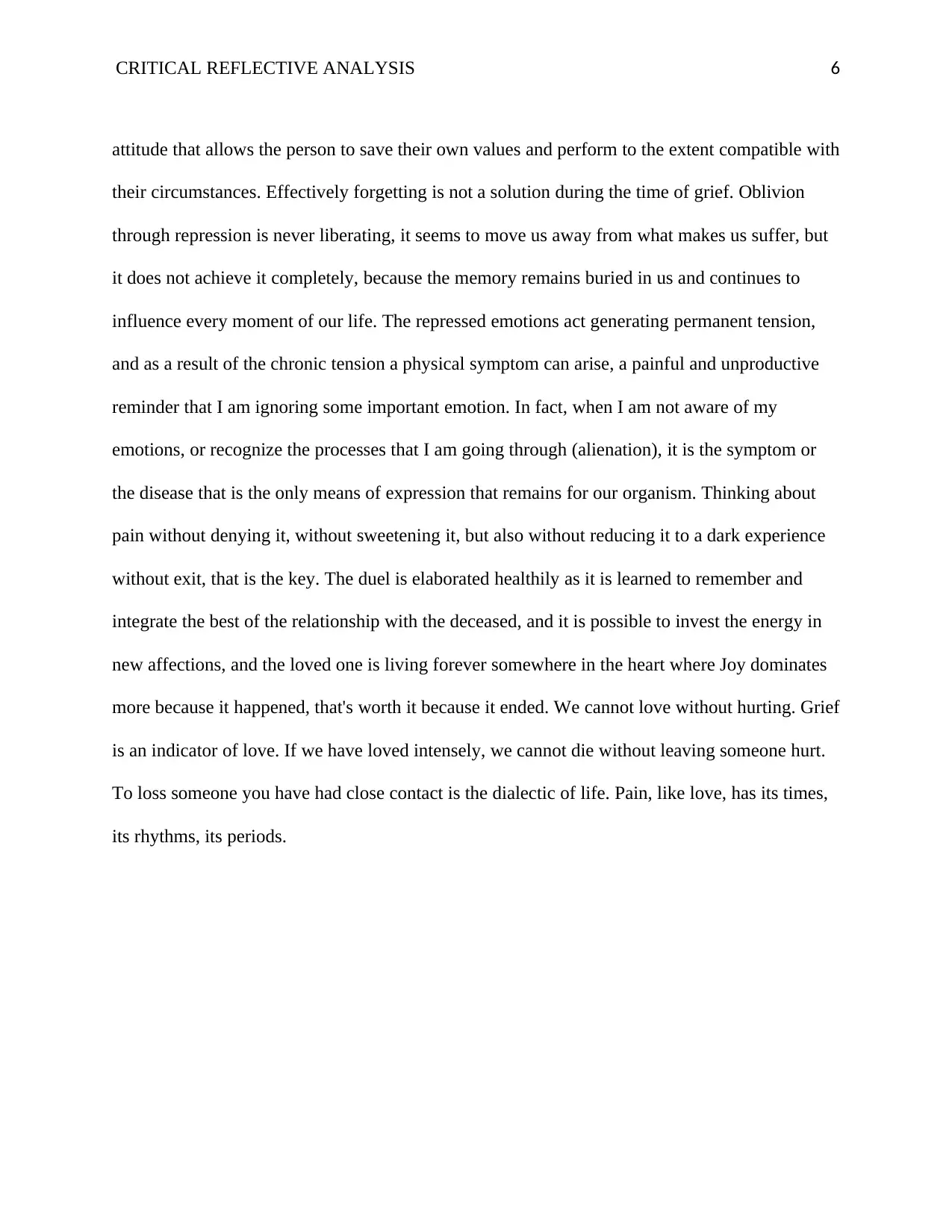
CRITICAL REFLECTIVE ANALYSIS 6
attitude that allows the person to save their own values and perform to the extent compatible with
their circumstances. Effectively forgetting is not a solution during the time of grief. Oblivion
through repression is never liberating, it seems to move us away from what makes us suffer, but
it does not achieve it completely, because the memory remains buried in us and continues to
influence every moment of our life. The repressed emotions act generating permanent tension,
and as a result of the chronic tension a physical symptom can arise, a painful and unproductive
reminder that I am ignoring some important emotion. In fact, when I am not aware of my
emotions, or recognize the processes that I am going through (alienation), it is the symptom or
the disease that is the only means of expression that remains for our organism. Thinking about
pain without denying it, without sweetening it, but also without reducing it to a dark experience
without exit, that is the key. The duel is elaborated healthily as it is learned to remember and
integrate the best of the relationship with the deceased, and it is possible to invest the energy in
new affections, and the loved one is living forever somewhere in the heart where Joy dominates
more because it happened, that's worth it because it ended. We cannot love without hurting. Grief
is an indicator of love. If we have loved intensely, we cannot die without leaving someone hurt.
To loss someone you have had close contact is the dialectic of life. Pain, like love, has its times,
its rhythms, its periods.
attitude that allows the person to save their own values and perform to the extent compatible with
their circumstances. Effectively forgetting is not a solution during the time of grief. Oblivion
through repression is never liberating, it seems to move us away from what makes us suffer, but
it does not achieve it completely, because the memory remains buried in us and continues to
influence every moment of our life. The repressed emotions act generating permanent tension,
and as a result of the chronic tension a physical symptom can arise, a painful and unproductive
reminder that I am ignoring some important emotion. In fact, when I am not aware of my
emotions, or recognize the processes that I am going through (alienation), it is the symptom or
the disease that is the only means of expression that remains for our organism. Thinking about
pain without denying it, without sweetening it, but also without reducing it to a dark experience
without exit, that is the key. The duel is elaborated healthily as it is learned to remember and
integrate the best of the relationship with the deceased, and it is possible to invest the energy in
new affections, and the loved one is living forever somewhere in the heart where Joy dominates
more because it happened, that's worth it because it ended. We cannot love without hurting. Grief
is an indicator of love. If we have loved intensely, we cannot die without leaving someone hurt.
To loss someone you have had close contact is the dialectic of life. Pain, like love, has its times,
its rhythms, its periods.
⊘ This is a preview!⊘
Do you want full access?
Subscribe today to unlock all pages.

Trusted by 1+ million students worldwide
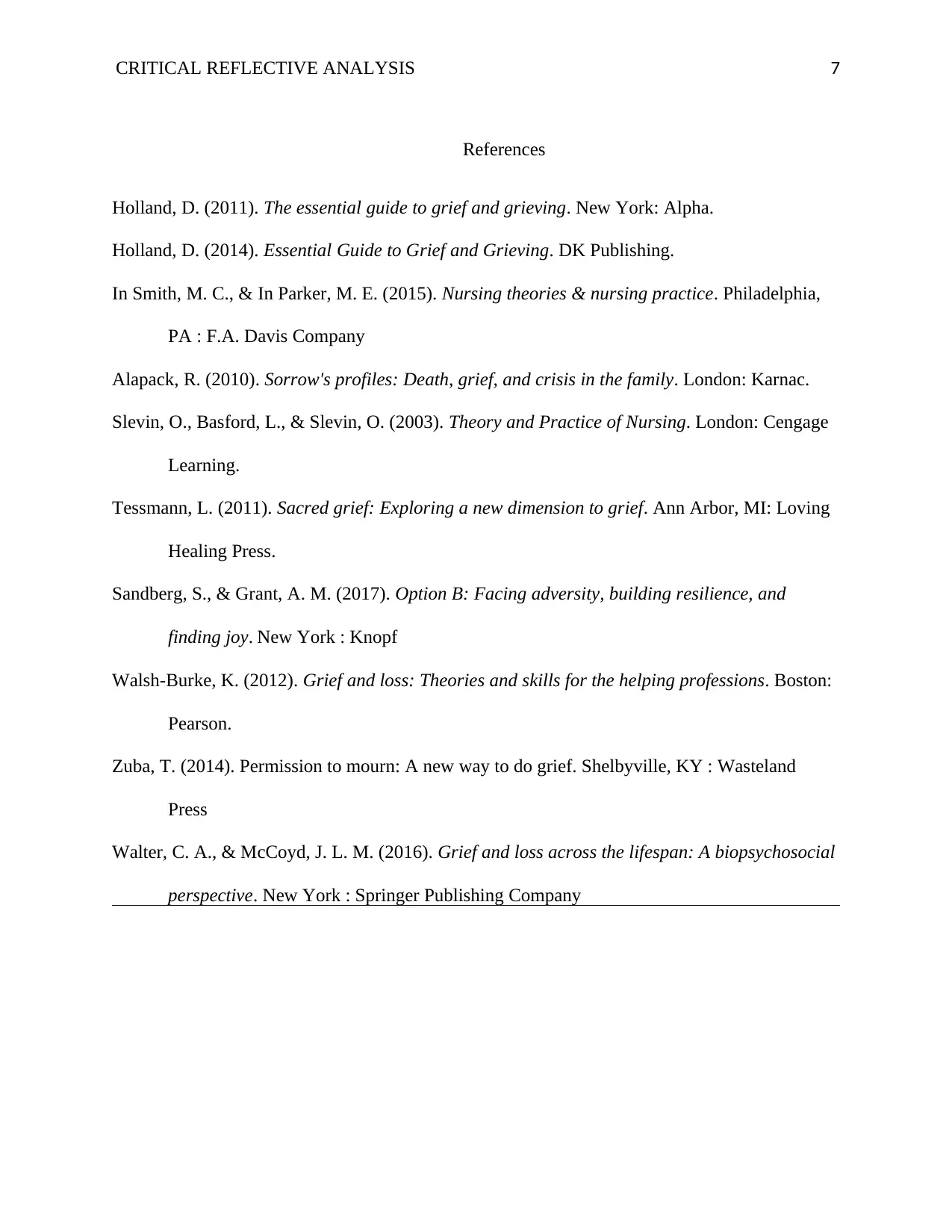
CRITICAL REFLECTIVE ANALYSIS 7
References
Holland, D. (2011). The essential guide to grief and grieving. New York: Alpha.
Holland, D. (2014). Essential Guide to Grief and Grieving. DK Publishing.
In Smith, M. C., & In Parker, M. E. (2015). Nursing theories & nursing practice. Philadelphia,
PA : F.A. Davis Company
Alapack, R. (2010). Sorrow's profiles: Death, grief, and crisis in the family. London: Karnac.
Slevin, O., Basford, L., & Slevin, O. (2003). Theory and Practice of Nursing. London: Cengage
Learning.
Tessmann, L. (2011). Sacred grief: Exploring a new dimension to grief. Ann Arbor, MI: Loving
Healing Press.
Sandberg, S., & Grant, A. M. (2017). Option B: Facing adversity, building resilience, and
finding joy. New York : Knopf
Walsh-Burke, K. (2012). Grief and loss: Theories and skills for the helping professions. Boston:
Pearson.
Zuba, T. (2014). Permission to mourn: A new way to do grief. Shelbyville, KY : Wasteland
Press
Walter, C. A., & McCoyd, J. L. M. (2016). Grief and loss across the lifespan: A biopsychosocial
perspective. New York : Springer Publishing Company
References
Holland, D. (2011). The essential guide to grief and grieving. New York: Alpha.
Holland, D. (2014). Essential Guide to Grief and Grieving. DK Publishing.
In Smith, M. C., & In Parker, M. E. (2015). Nursing theories & nursing practice. Philadelphia,
PA : F.A. Davis Company
Alapack, R. (2010). Sorrow's profiles: Death, grief, and crisis in the family. London: Karnac.
Slevin, O., Basford, L., & Slevin, O. (2003). Theory and Practice of Nursing. London: Cengage
Learning.
Tessmann, L. (2011). Sacred grief: Exploring a new dimension to grief. Ann Arbor, MI: Loving
Healing Press.
Sandberg, S., & Grant, A. M. (2017). Option B: Facing adversity, building resilience, and
finding joy. New York : Knopf
Walsh-Burke, K. (2012). Grief and loss: Theories and skills for the helping professions. Boston:
Pearson.
Zuba, T. (2014). Permission to mourn: A new way to do grief. Shelbyville, KY : Wasteland
Press
Walter, C. A., & McCoyd, J. L. M. (2016). Grief and loss across the lifespan: A biopsychosocial
perspective. New York : Springer Publishing Company
1 out of 7
Related Documents
Your All-in-One AI-Powered Toolkit for Academic Success.
+13062052269
info@desklib.com
Available 24*7 on WhatsApp / Email
![[object Object]](/_next/static/media/star-bottom.7253800d.svg)
Unlock your academic potential
Copyright © 2020–2026 A2Z Services. All Rights Reserved. Developed and managed by ZUCOL.





